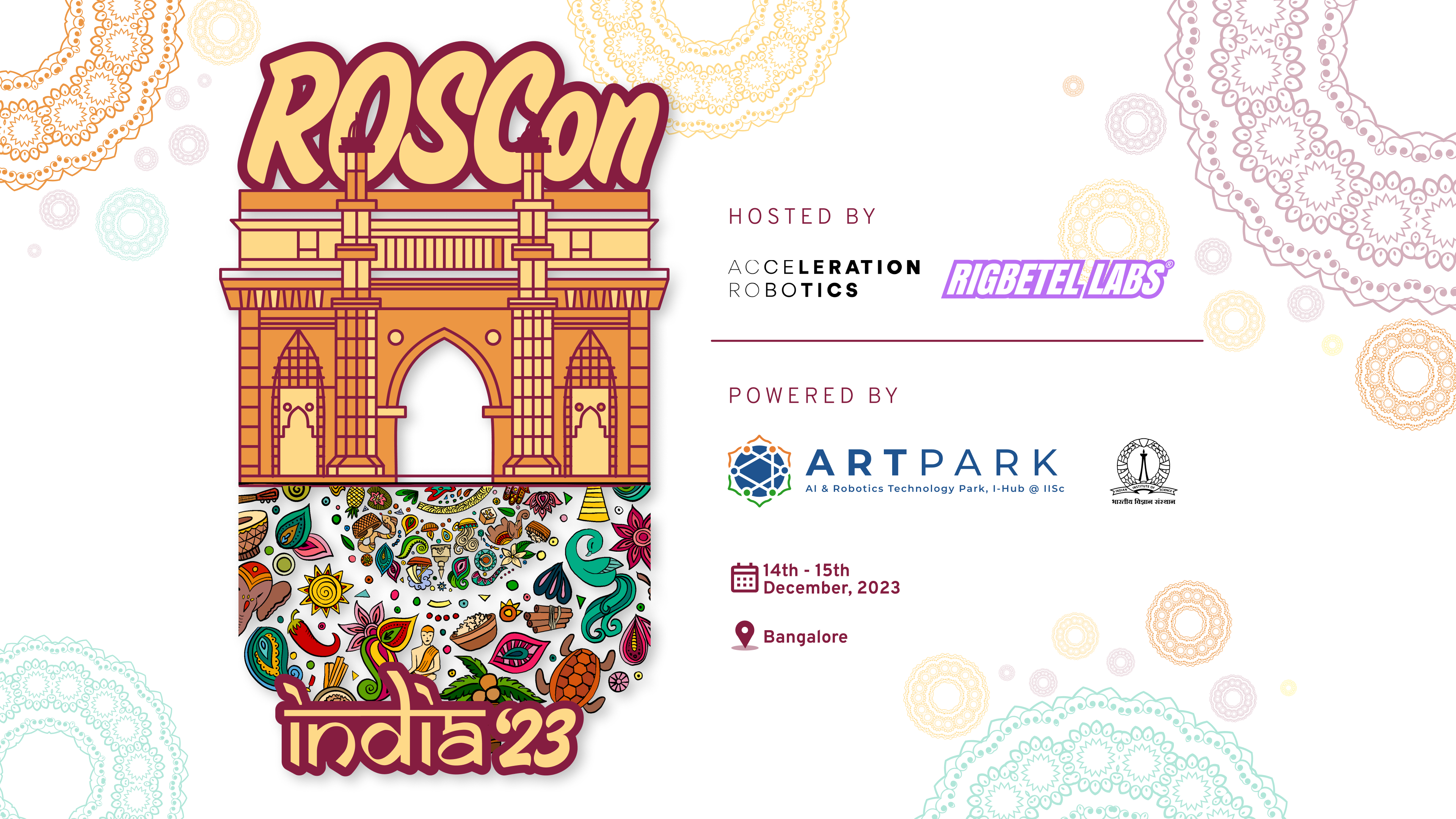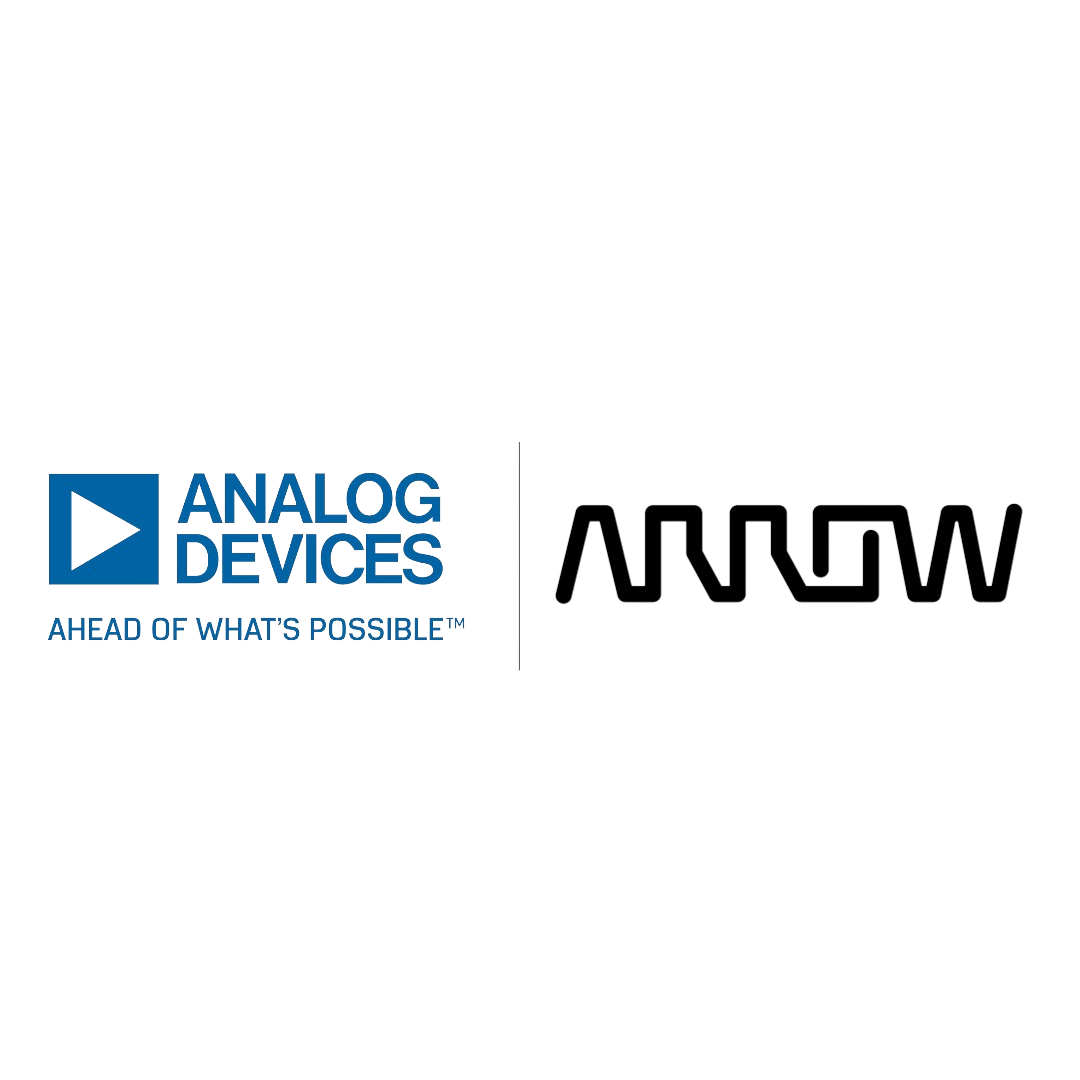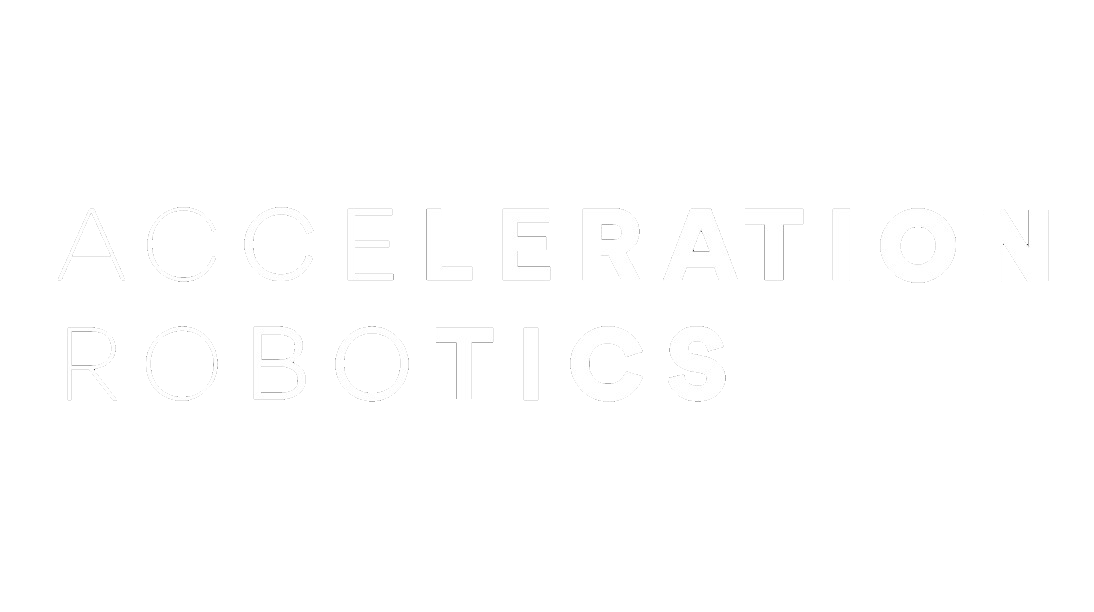
Bangalore, India
December 14th - 15th, 2023
- Check out the Agenda for all our panel discussions!
- The tickets for ROSCon India 2023 are now sold out! Thank you for your support!
- Glad to announce that Analog Devices | ARROW, NVIDIA, and Qualcomm are the Platinum Sponsors for ROSCon India 2023!
- Rajesh Mahapatra from Analog Devices will be joining our Keynote speakers lineup!
- Dev Singh from Qualcomm will also be joining our Keynote speaker lineup!
- The Program Agenda for ROSCon India is out! Check it out!
- Niladri Roy from Intel's PSG Industrial Unit will also be joining as Keynote speaker.
- Geoffrey Biggs CTO, Open Robotics will be joining as Opening speaker for ROSCon India!
- Glad to welcome Dr. Ricardo Tellez as a keynote speaker for ROSCon India 2023!
ROSCon India is the official domestic ROSCon for India, held by the local ROS community with the support of Open Robotics. Targeted at the local Indian robotics community, it provides an opportunity for ROS developers, hobbyists, researchers and industry professionals alike, to spend two days together learning from and networking with each other.
Like the international ROSCon, ROSCon India is a developers conference in the model of PyCon and BoostCon. Following the success of ROS Developers Meetups(Pune, Bangalore, Delhi) held by Acceleration Robotics and ROS India Summit by RigBetel Labs, ROSCon India is a continuation of these community efforts at a larger scale.To this end, the event will be powered by ARTPARK at Indian Institute of Science(IISc)
Dates
ROSCon India 2023 Key Dates
Call for Proposals circulated
September 1st, 2023
Proposal submission deadline
October 31st, 2023
Proposal acceptance notification
November 10th, 2023
Early registration deadline
October 15th, 2023
Normal registration deadline
December 1st, 2023
Sponsors
attend
The registrations for ROSCon India 2023 is no longer open. We are overwhelmed by the great positive response to the event.
For the registered attendees, the ticket includes -
- Entry to the event for both days (14th & 15th Dec)
- Entry to the Talks, Panel Discussions, and Expo
- Lunch and Refreshments for both days
- Event Swag, Goodies & Souvenirs
Getting to ROSCon India 2023
Venue
ROSCon India 2023 will be held at the JN Tata Auditorium, located at the prestigious Indian Institute of Science, in India’s Tech Hub, Bangalore.
Program
Conference Agenda - Day 1
Event Check-in
Check-in to ROSCon India, Collect Event Swag
8:30 am - 09:45 am
Welcome Address
10:00 AM - 10:20 AM
Opening Keynote
Geoffery Biggs, CTO Open Robotics
10:20 AM - 10:40 AM
Navigating the Future of Robotics with ROS
Rajesh Mahapatra, Analog Devices
10:45 AM - 11:15 AM
The precision and adaptability embedded in Analog Devices' technology empower robots to navigate diverse environments with enhanced efficiency and accuracy. In this talk, we will show some of our solutions and some trends in robotics. And showcase how ROS has helped us achieve seamless integration for some complex problems in robotics.
Why do we use ROS even though we don't make robots?
Mayank Joneja, Vimaan.ai
11:15 AM - 11:35 AM
At Vimaan.ai we build a wide range of products for warehouse inventory management. While our origins involve our indoor autonomous drone platform for cycle counting, we have since evolved to several computer vision based solutions for solving a host of other problems in the warehouse. ROS still remains a key part of our embedded capture systems' as well as server side pipelines' software architecture. In this talk, we would like to highlight the benefits as well as challenges we've faced with using ROS in the logistics industry even though we are not designing autonomous mobile robots per se.
Tea/Coffee Break
11:35 AM - 11: 50 AM
Current Scenario and Future prospects of Robot Visualisation & Controls through AR/VR
Yatish Kumavat, RigBetel Labs
11:55 AM - 12:15 PM
We've engineered an advanced navigation system for ROS based mobile robots and maniplators, harnessing concepts of augmented reality (AR), Robot Operating System 2 (ROS 2), and the concept of Digital Twins. The current GUI used in the industry for controlling ROS robots are based on Web (using React JS, Foxglove) or native devices that work only on Tablets and PC. But our mission is to overcome navigation challenges by exploiting Google's ARCore platform, elevating user interaction and comprehension. Big Deep Tech Companies like Apple, Meta, Google, Jio are already getting ready for the future with AR/VR Glasses. And we are ready for this future by developing a universal application that can not only work on Mobile Phones, Tablets, PCs but also on AR and VR Devices and let you control and monitor ROS-based robots
Semiconductor Ecosystem for Robotics and ROS
12:15 PM - 01:00 PM
The panelists for the panel will be:
- Manmeet Singh, Qualcomm: Senior Director, Strategy and Analysis at Qualcomm India
- Srinivas Prasad, Analog Devices: Senior Director, Semiconductor industry and wireless communications
- Jigar Halani, NVIDIA: Director of the Enterprise Solutions Architecture & Engineering team for South Asia.
- Niladri Roy, Intel: Represents Industrial robotics, AI, and Smart energy
- Amit Gupta, Einfochips: Associate Director, Head of robotics, Centre of Excellence
Moderated by Gaurav Vikhe, Acceleration Robotics
Lunch Break
01:00 PM - 02:00 PM
Qualcomm Keynote
Dev Singh, Qualcomm
02:00 PM - 02:30 PM
To Be Declared
Robot software deployment: Testing, Dockers, Sims and Multi-Arch builds
Gaurav Gupta, Black Coffee Robotics
2:40 PM - 03:00 PM
The focus of this talk is to present a unified framework involving unit tests, integration tests, and systems tests with use of dockers and simulation-integrated CI/CD pipeline for generating deployment ready robot code with quality assurance in sight. These will be highlighted with a case study of a multi-robot navigation system.
Adding custom features to Gazebo Sim Simulator - Weather Artefacts
Naman Malik, Acceleration Robotics
03:00 PM - 03:15 PM
The talk introduces a custom simulator built on Gazebo, enabling the creation of diverse outdoor simulations for UGV, UAV, USV, and UUV scenarios. It offers tunable effects like weather (fog, snow, dust, rain etc), dynamic sunlight, and ocean currents etc
An accessible ROS-based framework for immersive evaluation of prosthetic arm control
Shivani Guptasarma, Stanford
03:15 PM - 03:30 PM
People with whole-arm Amputations struggle to control prosthetic arms, and most prefer not to use them at all. Improving control and feedback interfaces might contribute – in the future – to making whole-arm prosthetics a practical reality. However, in the meantime, these devices remain inaccessible and expensive, for both users and researchers. We present a research platform for prototyping prosthetic control methods in a simulated environment. The system uses ROS to integrate marker-based motion capture, manual control, gaze tracking, intent estimation, and augmented reality visualisation. It can be adapted to various methods of manual input, and other kinds of wearable robots.
Talking ROS 2 with Clojure
Abishek Goda, Rohabini
03:30 PM - 03:45 PM
In this talk, I will share my experience building a web-first system interfacing with ROS 2 using Clojure. While it is uncommon to build ROS applications using Clojure, Clojure is an excellent language to build engineering-scale applications quickly. I will discuss my challenges during the implementation process, the choice of Clojure as the language, its ecosystem for ROS 2 (or the lack of it), and my innovative workarounds. Furthermore, I will introduce my open-source bridge library to implement a native interface for ROS 2 from within Clojure. This talk will benefit anyone implementing web interfaces for ROS.
Tea/Coffee Break
3:45 PM - 4:00 PM
ROS2 Communication optimization with Zenoh-Bridge-DDS
Vivek Pandey, ZettaScale
4:00 PM - 04:20 PM
Introduction of latest Zenoh bridges for ROS 1 and ROS 2 respectively, Brief about how Zenoh bridges improve responsiveness and minimize overhead by mapping ROS concepts directly to Zenoh, Introduction to how a teleoperation application can work seamlessly with ROS 1 and ROS 2 robots.
Automated Code Generation of Simulink Models as ros_control Controllers
Jagadeesh Konakalla, MathWorks
04:20 PM - 04:40 PM
Simulink is the de-facto controller develoPMent tool in many industrial applications while ros_control is a real-time controller develoPMent framework for ROS. The motivation behind this project is to show how to fit a Simulink model into the ros_control framework. With the result of this project, you can auto-generate C++ code for a controller and package and deploy it as a ros_control plugin as to the ros_control framework
Panel - VC Panel Investing in Robotics in India
04:45 PM - 05:30 PM
The panelists for the panel will be:
- Roopan Aulakh, Managing Director, pi Ventures
- Venkatesh Modi, Blume Ventures
- Vishesh Rajaram, Managing Partner, Speciale Invest
- Vinod Shankar, Founding Partner, Java Capital
Moderated by Ajay Sethi, Venture Partner, Accel
Lightning Talks
05:35 PM - 05:55 PM
Conference Agenda - Day 2
Event Check-in
Check-in to ROSCon India, Collect Event Swag
8:30 am - 09:45 am
Single chip implementation of eight robot access, with ROS 2 running in a processor sub-system
Niladri Roy, Intel PSG Industrial Business Unit
10:00 AM - 10:30 AM
Automatic Inertia Calculation for Robotic Links with SDFormat & Gazebo Harmonic
Jasmeet Singh, GSOC
10:30 AM - 10:50 AM
Physically accurate inertial parameters, including mass, center of mass, and moments of inertia, are essential for precise simulations. Visualizing parameters like moments of inertia can be challenging, and users may inadvertently input incorrect values, resulting in inaccurate simulations. In this presentation, I will highlight and explore a newly integrated feature in Gazebo and SDFormat. This feature enables users to automatically calculate moments of inertia for robotic links, addressing the potential for user error. The develoPMent of this feature was undertaken as part of the Google Summer of Code 2023 program.
RobotPerf: An Open-Source, Vendor-Agnostic, Benchmarking Suite for Evaluating Robotics Computing System Performance
Gaurav Vikhe, Acceleration Robotics
10:50 AM - 11:10 AM
We introduce RobotPerf, a vendor-agnostic benchmarking suite designed to evaluate robotics computing performance across a diverse range of hardware platforms using ROS 2 as its common baseline. The suite encompasses ROS 2 packages covering the full robotics pipeline and integrates two distinct benchmarking approaches: black-box testing, which measures performance by eliminating upper layers and replacing them with a test application, and grey-box testing, an application-specific measure that observes internal system states with minimal interference
Tea/Coffee Break
11:15 AM - 11:30 AM
Keynote Address 4
Ricardo Tellez, The Construct
11:30 AM - 12:00 PM
To Be Declared
Secure ROS 2 - Not a question of if, but when
Meet Gandhi, einfochips - An Arrow Company
12:00 PM - 12:20 PM
Using secure communication between ROS 2 nodes to prevent them from unauthorized access, modification, or destruction. The nodes will be using TLS (Transport Layer Security) provided by OpenSSL (https://www.openssl.org/) for authentication and encryption.
ROS and NVIDIA Isaac Sim: A Powerful Tandem for Swarm Robotics
Kartik Soni, Sanket Khade - RigBetel Labs
12:20 PM - 12:35 PM
This talk will discuss the technical nuances of implementing and deploying swarm robotics using ROS and NVIDIA Isaac Sim. We will explore the challenges and opportunities of using these powerful tools to create and control coordinated teams of robots. We will also share insights on how to leverage the unique capabilities of ROS and NVIDIA Isaac Sim to develop innovative swarm robotic solutions.
DevOps for Robotics: The Secret to Scaling Your Robotic Deployment
Ragesh Ramachandran, Fraunhofer IPA
12:40 PM - 01:00 PM
As the field of robotics continues to evolve, the need for efficient methods to deploy and operate ROS (Robot Operating System) packages on robots becomes critical. There are several different ways to deploy and operate ROS packages on robots. The goal of this talk is to discuss best practices for improving the Software Development Life Cycle of ROS packages for production, including open-source tools used in packaging, deployment, and monitoring. It will also discuss the benefits of having a DevOps strategy for robotics. The presentation is for the ROS users and robotics startups who want to learn how to scale their robotic deployments using DevOps.
Lunch Break
01:00 PM - 02:00 PM
Robotics Landscape in India
02:00 PM - 02:45 PM
The panelists for this panel will be:
- Dr Ravi Kumar G. V. V, Infosys: Vice President and Head Advanced Engineering Group (AEG) of Engineering Services
- Naveen Arulselvan, ATI Motors: Chief Technology Officer
Moderated by Bharadwaj Amrutur, Executive Director and Chief Technologist
NVIDIA Keynote
Jigar Halani
02:45 PM - 03:15 PM
ROS-Based Multi-Agent Systems COntrol Simulation Testbed (MASCOT)
Arvind Pandit, Indrones
3:15 PM - 03:30 PM
The work presents a simulation testbed developed for testing and demonstration of decentralized control algorithms designed for multi-agent systems. Aimed at bridging a gap between theory and practical deployment of such algorithms, this testbed provides a simulator with multi-agent systems having quadcopter agents. It is used to test the control algorithms designed assuming simple agent dynamics like a single or double integrator. This is based on the fact that under certain assumptions, quadcopter dynamics can be modeled as a double integrator system. A gazebo simulator with a physics engine as ODE (Open Dynamics Engine) is used for simulating the dynamics of the quadcopter. Robot Operating System is used to develop communication networks and motion control algorithms for the different agents in the simulation testbed. The performance of the test bed is analyzed by implementing linear control laws such as position control, leaderless consensus, leader-follower consensus, and non-linear control law for min-max time consensus
Meet Beagle Flap, Bird-like Flapping Wing Robot, runs ROS
Kurva Prashanth, BeagleBoard.org
03:30 PM - 03:45 PM
In this talk, we will present Beagle Flap, A flapping wing aerial robot with Linux-based AutoPilot. It enables the development of control and navigation algorithms for autonomous outdoor flight operations. Highlights include hardware overview, ArduPilot integration with MAVROS, development of Beagle Flap, custom add-on board design, and the implementation of DroneForce - a framework facilitating custom offboard controllers with Ardupilot and MAVROS. Additionally, insights are shared on leveraging open hardware projects such as BeagleBoard.org, can catalyze the Do-it-yourself designs for robotics research.
ROS in Agriculture, Autonomous Row Centering in Standard Orchards
Ramana Botta, Boson Motors
03:45 PM - 04:00 PM
We present our work on autonomous row centering on standard orchards, which we have been working from our year by now. We will present how we are using ROS tools like gazebo, Rviz and Foxglove studio for testing and debugging our algorithm and also we will present what all the packages we use in developing our product and the challenges and opportunities in agriculture
Tea/Coffee Break
04:00 PM - 4:15 PM
Integrating Custom Simulations with ROS
Sakshay Mahna, Mathworks
04:15 PM - 04:30 PM
The talk focuses on the integration of ROS (Robot Operating System) with custom or non-mainstream simulators and the benefits it offers. Simulations are crucial for verifying solutions before implementing them in robots that need to perform complex tasks autonomously. However, not all simulators are suitable for all projects. Projects like developing Gripper Algorithms, Algorithms for Driving with multiple actors, or Multi-Drone Algorithms require specific simulation components. Off-the-shelf simulators like Gazebo, Webots, or Carla are general 3D simulators and may not suffice for these projects. To address this, custom or non-mainstream simulators are necessary, but they may not be initially compatible with ROS. Manual integration with ROS enables the utilization of pre-existing algorithms, facilitates communication between components, and enables distributed processing, AMong other benefits.
Aquasee : Underwater Image Enhancement
Thomas Kuruvila
04:30 PM - 04:45 PM
Aquasee is an open source ROS package for underwater image enhancement. The aim is to democratise and widen the use of Autonomous Underwater Vehicles (AUV’s) and Remotely Operated Vehicles (ROV’s) for underwater exploration. The package provides a plug and play mechanism to enhance underwater images through hardware abstraction. The package provides rules to integrate any custom enhancement algorithm of your choice, making it developer friendly. The most iconic feature of the package is that it allows for water quality feedback from a TDS sensor. Total dissolved salts affect visibility because of dispersion and with additional feedback we model dispersion right into the enhancement suite.
Advocating for Open Source Robotics in India
04:45 PM - 05:30 PM
A "fireside chat" between:
- Geoffrey Biggs, Open Robotics: Chief Technology Officer
- Ricardo Tellez, The Construct: Founder and Chief Executive Officer
- Prateek Nagras, Acceleration Robotics: Chief Executive Officer
Closing Remarks
5:30 PM
Organizers
Organizing Committee
General Co-Chairs
Pallavi Saha, RigBetel Labs
Gaurav Vikhe, Acceleration Robotics
Organizing Committee Members
Raghu Dharmaraju, CEO, ARTPARK - IISc
Syed Adil Hassan, Head of Startups, ARTPARK-IISc
Divya Radhakrishna Verma, Senior Project Manager, Bosch Global Software Technologies
Amit Gupta, Associate Director, eInfochips (An Arrow Company)
Program Committee
General Co-Chairs
Prateek Nagras, Acceleration Robotics
Lentin Joseph, Qbotics Labs
Programming Committee Members
Pranshu Tople, Co-Founder, RigBetel Labs
Harsh Deshpande, Research Engineer, Fraunhofer IPA
Dr Bharadwaj Amrutur, Research Head and Director, ARTPARK - IISc
Shubham Nandi, Co-Founder at RigBetel Labs
Code of Conduct
All attendees, speakers, sponsors and volunteers at our conference are required to agree with the following code of conduct. Organisers will enforce this code throughout the event. We expect cooperation from all participants to help ensure a safe environment for everybody.






